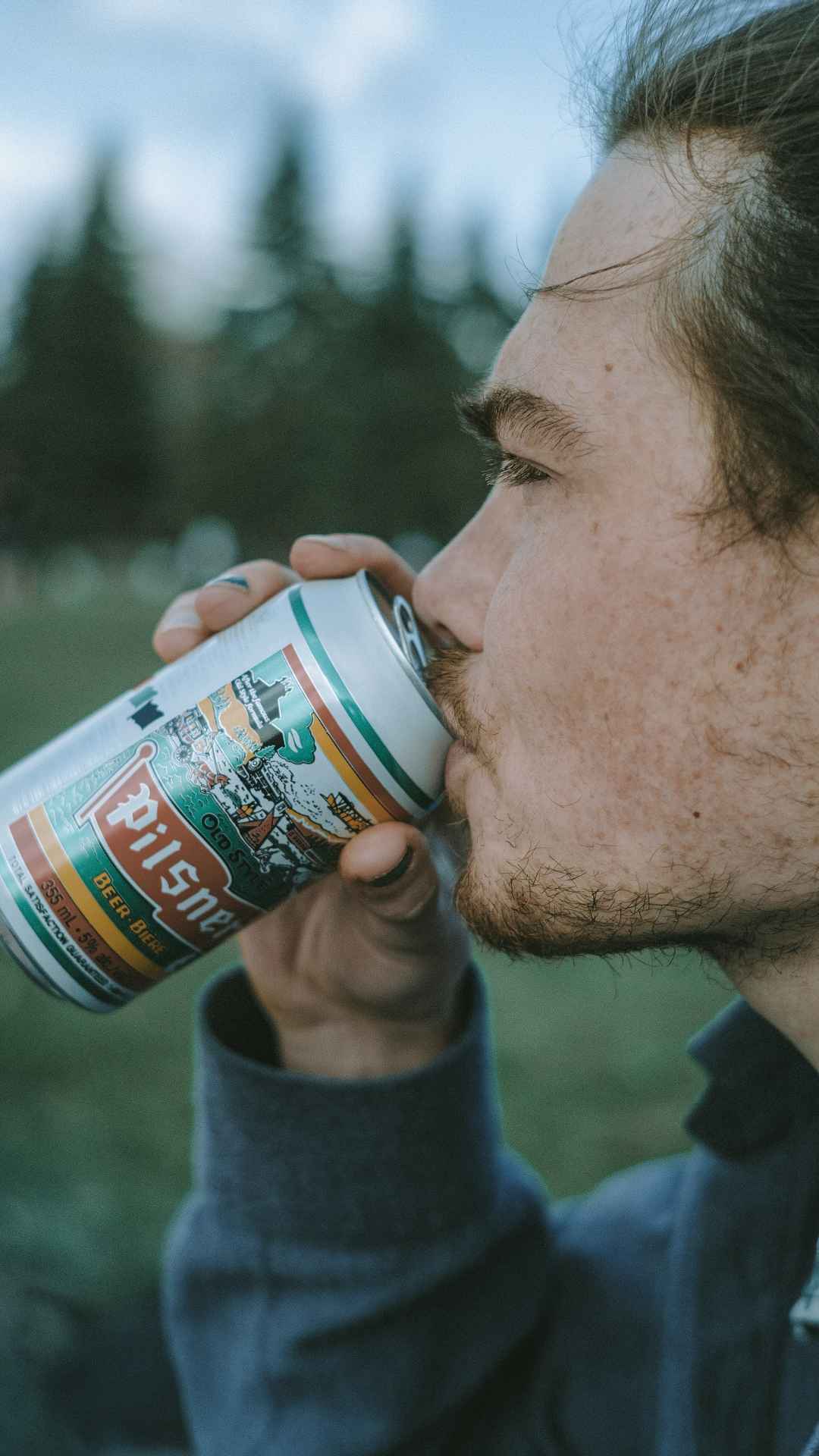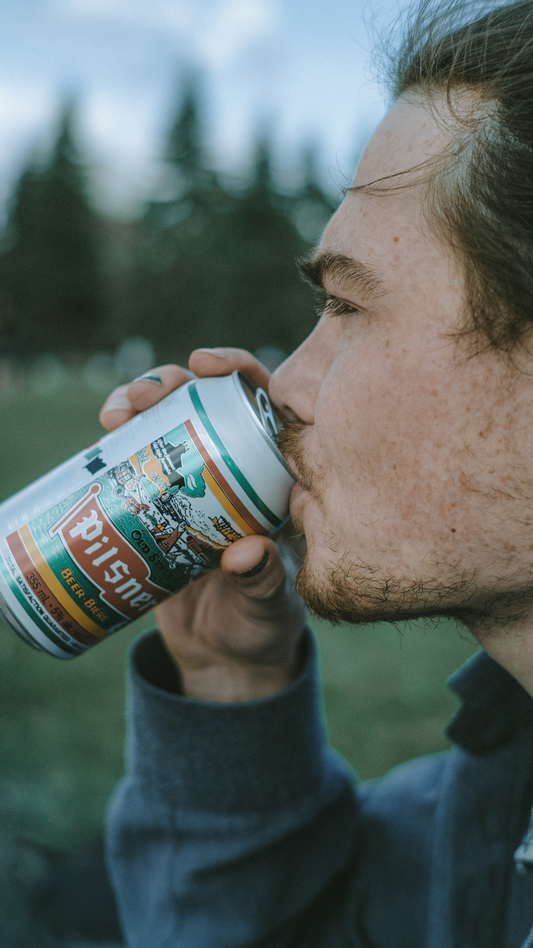WHAT IS TESTOSTERONE?
Testosterone is what makes a man a man. It's the hormone responsible for primary male sexual development, which includes sperm production, enlargement of the penis and testes, and sex drive. It's also involved in the development of male characteristics, such as skeletal muscle growth, facial and body hair and a deep voice.
WHY ARE T-LEVELS LOWER AMONGST GEN-Z & MILLENNIALS?

It's normal for testosterone levels to decline as you get older, but for some reason, there's been a population-level drop with each generation, at least since the 70's. Researchers have discovered that for example a 65-year-old man in 2002 would have testosterone levels 15 percent lower than those of a 65-year-old in 1987. This means, on average, Gen Zers and millennials have significantly lower T-levels compared to their predecessors.
Furthermore, researchers have also reported a downward trend in sperm count and semen volume over the past 50 years.
This decline is believed to be due to a combination of factors, such as obesity, sedentary lifestyles, stress and environmental toxins.
Why should we be worried? Because low T-levels are associated with a decrease in testicular size, erectile dysfunction, a drop in libido, lower bone density, muscle mass decline, increased fat production, poor concentration and memory, anxiety, poor sleep quality and decreased erythropoiesis (red blood cell production), which can lead to anaemia.
SYMPTOMS OF LOW TESTOSTERONE
Symptoms of low testosterone can often be subtle and can be physical, cognitive, or sexual, and include:
+ Reduced sex drive.
+ Erectile dysfunction.
+ Decrease in testicular/penis size.
+ Hair loss.
+ Symptoms of depression.
+ Difficulties with concentration and memory.
+ Fatigue/ decreased energy.
+ Moodiness and irritability.
+ Loss of muscular strength and lean muscle mass.
+ Increase in belly fat.
There are many other possible reasons for these symptoms, including certain medical conditions, loss of, or harm to, the testicles, diabetes, and obesity. See your doctor if you have any of these symptoms. Your GP may order a blood test to measure your testosterone levels.
HOW TO INCREASE T-LEVELS NATURALLY
To increase your testosterone levels, there are several things you can do. First, you can try to maintain a healthy weight. Being overweight or obese can lead to a decrease in testosterone levels.
EXERCISE

Exercise is also important for maintaining healthy testosterone levels. Resistance training, in particular, has been shown to be effective at boosting testosterone levels. Engaging in regular physical activity can help to increase muscle mass, boost your metabolism, and improve your overall health.
PROPER NUTRITION
Maintaining a balanced diet that includes an adequate intake of essential nutrients, healthy fats, lean proteins, and whole grains is crucial for supporting optimal hormone production, including testosterone. Maintaining a good body composition is helpful, as increased body fat is associated with low testosterone.
Try and incorporate certain foods into your diet that are known to boost testosterone levels. Foods such as eggs, oysters, and fatty fish are high in zinc, which is essential for testosterone production. In fact a systematic review of 38 studies concluded that zinc deficiency reduces testosterone levels and zinc supplementation improves testosterone levels. Furthermore, the researchers found that zinc levels are strongly correlated with testosterone, and that even moderate supplementation plays an important role in improving the levels of testosterone and other androgens.
VITAMIN D & SUN EXPOSURE
Ensuring sufficient vitamin D3 levels, either through exposure to natural sunlight or through supplementation, has been linked to higher testosterone levels. Adequate vitamin D3 intake is essential for people already with deficiencies.
LIMIT ALCOHOL CONSUMPTION
Research shows that harmful use of alcohol and drugs can affect sex hormone levels, including reducing testosterone. Another reason to “just say no”.
QUALITY SLEEP AND STRESS MANAGEMENT
Establishing healthy sleep patterns is essential as sleep has been consistently proven to be one of the best performance enhancers you can implement into your routine. Getting enough quality sleep will also help with managing stress levels and is important for overall hormone balance.
Long-term stress can elevate levels of the hormone cortisol and elevations in cortisol can quickly reduce testosterone. These hormones work in a seesaw-like manner: as one goes up, the other comes down.
For example, one study found that sleeping only 5 hours per night was linked to a 15% reduction in testosterone levels. Another long-term study observed that those who slept only four hours per night had borderline deficient levels.
A separate study calculated that for every additional hour of sleep you get, testosterone levels rise 15% higher, on average.
Aim for 7 - 9 hours sleep every night, even if it means a shift in your schedule or a limit to your late-night plans.
NATURAL TESTOSTERONE BOOSTERS
Certain supplements can support testosterone levels. Here are some with scientific backing:
ASHWAGANDA - Also known as Withania somnifera is a herb that has been used in traditional Ayurvedic medicine for centuries. It is believed to have a variety of health benefits including fertility boosting properties for both men and women. When it comes to men, several studies have shown that ashwagandha supplements help increase testosterone levels and significantly boost sperm quality. For example:
A systematic review comprising 4 randomized controlled trials found that a 90-day treatment of ashwagandha improved sperm concentration, sperm motility, and semen volume.
A controlled study of 75 infertile men, found the group treated with ashwagandha root showed increased sperm count and motility. What’s more, the treatment led to a significant increase in testosterone levels. The researchers also reported that the group who took the herb had increased antioxidant levels in their blood.
A controlled study of 60 men, found those who received ashwagandha root for male infertility overall experienced better sperm quality, a decrease in stress and higher antioxidant levels. And the treatment resulted in pregnancy in the partners of 14% of the patients.
Ashwagandha may help increase t-levels by reducing the production of stress hormones, such as cortisol. High levels of cortisol can interfere with testosterone production, so reducing cortisol levels can help increase testosterone levels.
Ashwagandha has also been shown to increase muscle mass and reduce body fat. Want to know more? Click here.
TONGKAT ALI - Unlike anabolic steroids, the botanical Tongkat Ali does not shut down the body’s natural production of testosterone and sperm. Instead, it stimulates the body to naturally increase testosterone levels and improve muscle growth, strength, sperm quality and erectile function. For example:
A 2022 systematic review and meta-analysis of studies revealed that clinical trials reported a significant improvement in total testosterone levels after Tongkat Ali supplementation.
A controlled 24-week study involving 93 men and women aged 25-65y found that daily supplementation of 50mg Tongkat Ali in combination with multivitamins, was associated with significant increases in free testosterone. Males experienced a 582% average increase in free testosterone. Females experienced a 600% average increase in free testosterone.
A 12-week controlled study involving 105 men aged 50-70 with low testosterone found that Tongkat Ali supplementation of 200mg/day was associated with a 12% increase in total testosterone and a 17% increase in free testosterone.
A controlled 12 week study involving 109 men between 30-55y found that 300mg of Tongkat Ali (Eurycoma longifolia) supplementation resulted in: higher scores in overall erectile function and sexual libido (+14%), sperm motility (+44%) and semen-volume (+18.2%); and significantly improved fat mass lost in subjects with a BMI ≥ 25kg/m2.
A 12-week controlled study involving 26 men aged 45-60y with mild erectile dysfunction found that 200mg/day of Tongkat Ali supplementation was associated with significant improvements in the frequency of sexual intercourse, erection hardness, overall sexual wellbeing, and an increase in total testosterone levels.
ZINC - It’s well established that zinc plays an important role in the production and function of testosterone. Consequently, even moderate deficiency is associated with reduced testosterone levels in men. For example, a systematic review of 38 studies concluded that zinc deficiency reduces testosterone levels and zinc supplementation improves testosterone levels. Furthermore, the researchers found that zinc levels are strongly correlated with testosterone, and that even moderate supplementation plays an important role in improving the levels of testosterone and other androgens. Zinc also plays a significant role in the male reproductive system. For example, studies have found that a deficiency in Zinc impedes spermatogenesis and is a reason for sperm abnormalities and has a negative effect on serum testosterone concentration. Based on these findings, researchers have concluded that Zinc is very essential for male fertility.
VITAMIN C – Oxidative stress reduces testosterone synthesis. Vitamin C is a powerful antioxidant which protects the body against oxidative stress and can improve hormone profiles. For example, a study involving over 300 infertile men found that ascorbic acid (vitamin C) is associated with higher testosterone levels and improved androgenic status in infertile males. Research also suggests that vitamin C might play a role in certain biochemical pathways that support erectile function. For example, a review noted that vitamin C is one of several vitamins and minerals that support the biochemical pathway that leads to the release of nitric oxide. Nitric oxide (NO) is generally viewed as the principal agent responsible for relaxing the tissue inside the penis and allowing blood to flow in and create an erection.
VITAMIN B6 - Vitamin B6 contributes to the regulation of hormonal activity including maintaining healthy levels of testosterone. Furthermore, vitamin B6 is essential for the production of neurotransmitters, which are chemicals that transmit signals between nerve cells. These neurotransmitters play a crucial role in sexual arousal and response. Furthermore, researchers believe vitamin B6 may improve erectile function. This is because vitamin B6 is involved in the breakdown of homocysteine – an amino acid which can damage artery linings when allowed to build up in the circulation. Hardening and furring up of the arteries (atherosclerosis) is a leading cause of erectile difficulties in older males and in those with diabetes. For example, a systemic review and meta-analysis of nine studies including 1,320 men found that the men with erectile dysfunction (ED) were approximately twice as likely to have elevated levels of homocysteine.
VITAMIN B12 - Research shows that when our body lacks enough B12, testosterone levels can drop significantly and that vitamin B12 also impacts testicular health, sperm quality, sperm count as well as energy levels and stamina. For example, a meta-analysisconcluded that mainstream published work demonstrates the positive effects of vitamin B12 on semen quality: first, by increasing sperm count, and by enhancing sperm motility and reducing sperm DNA damage. Furthermore, researchers believe vitamin B12 supplements may improve erectile function. This is because like vitamin B6, vitamin B12 is also involved in the breakdown of homocysteine which can damage artery linings. For example, a study involving 691 men who identified as having erectile dysfunction (ED), found that age, homocysteine (Hcy) and vitamin B12 levels were the main determinants in ED. Hcy levels were increased in men over 45 with ED, but vitamin B12 was decreased in men under 45 with ED.
VITAMIN D - Although research into the effects of vitamin D on sexual performance is limited, some studies have found a link between vitamin D deficiency and male sexual function. For example, a study involving 260 men clearly demonstrates a direct and positive relationship between vitamin D levels and overall semen quality, male reproductive potential and testosterone levels. And a meta-analysis of 8 studies involving 4055 patients found that vitamin D deficiency may be associated with severe forms of erectile dysfunction.
GINGER - Studies suggest that consistent ginger intake improves the bioavailability of testosterone in the blood. For example, a studyof 75 infertile men aged 19-40 found that ginger supplementation for 3 months resulted in a significant rise in testosterone (+18%) and an improvement in sperm count (+16%) and sperm motility (+47%).
FENUGREEK - Research suggests that fenugreek can boost testosterone levels and lead to improved libido and sexual function. For example, a controlled study involving 120 healthy men aged 43-70y, found that those taking Trigonella foenum-graecum (commonly known as fenugreek) seed extract at a dose of 600mg/day for 12 weeks experienced improved sexual function and increased testosterone levels. A separate controlled study involving 60 healthy males between 25-52y, found 600mg of Fenugreek extract had an overall positive effect on physiological aspects of libido. In particular, there was a significant increase in the subdomains of sexual arousal and orgasm.
TURKESTERONE - Turkesterone is a natural steroid derived from the Ajuga Turkestanica plant and is known for its potential anabolic and adaptogenic effects. Turkesterone works by interacting with the body's hormonal and metabolic systems. It can increase protein synthesis, enhancing muscle growth and recovery, similar to anabolic steroids but without their side effects. Additionally, it may help the body adapt to stressors, improving overall resilience and performance. For example, a study concluded that the results of ecdysteroids, including Turkesterone are similar to that produced by androgenic steroids and should be classed as “anabolic agents” due to its effects on skeletal muscle growth and physical performance. Which is why it comes as no surprise that it has taken the body building market by storm for its performance-enhancing benefits without side effects!
TRIBULUS TERRESTRIS - It has been long believed that Tribulus terrestris (TT), an annual herbaceous plant, possesses aphrodisiac properties. For example, an extensive review of phytochemical and pharmacological studies in humans and animals revealed an important role for TT in treating erectile dysfunction and sexual desire problems.
FADOGIA GRESTIS - Extract from the botanical fadogia agrestis, is taken as a supplement for its potential benefits in enhancing libido, increasing testosterone levels, improving muscle growth, and aiding in athletic performance. For example, a 5-day rodent studyobserved a 600% increase in blood testosterone levels after 100mg/kg of Fadogia agrestis. Another animal study observed that Fadogia agrestis supplementation increased markers of libido, increased intercourse duration and delayed ejaculation.
HIMMENSE BOOST - Our Testosterone formula. A daily supplements with a blend of 13 active ingredients including Vitamins, Zinc, Ashwagandha, Tongkat Ali, Fenugreek, Ginger, Fadogia Agrestis and Tribulus Terrestris, in doses that make a difference to support your T-Levels. So you can feel like your masculine self again.
AVOID ENDOCRINE DISRUPTORS
Endocrine-disrupting chemicals (EDCs), found in plastics, pesticides and certain household products, are another significant factor believed to be negatively impacting testosterone levels.
Exposure to bisphenol A (BPA), commonly found in plastics, has been found to bind to androgen receptors, reducing testosterone levels and fertility. Research suggests that high exposure to phthalates, which are also found in plastics, is associated with reduced testosterone levels.
Men who have used steroids, selective androgen receptor modulators (SARMs), and other hormone-disrupting drugs are also at risk of developing low testosterone due to the disruption that exogenous hormones cause to their own production of testosterone.
CONCLUSION
In conclusion, testosterone levels are impacted not just by ageing, but other factors too, including obesity, stress, mental health and environmental toxins. To increase your testosterone levels, you can try maintaining a healthy weight, exercising regularly, prioritising sleep and taking supplements to boost your testosterone levels naturally. For further tips read our blog on How to boost Testosterone Naturally.
References:
1.Travison et al. The relative contributions of aging, health, and lifestyle factors to serum testosterone decline in men. J Clin Endocrinol Metab. 2007
2.Nyante et al. Trends in sex hormone concentrations in US males: 1988-1991 to 1999-2004. Int J Androl. 2012
3.Lokeshwar et al. Decline in Serum Testosterone Levels Among Adolescent and Young Adult Men in the USA. Eur Urol Focus. 2021
4.Andersson et al. Secular decline in male testosterone and sex hormone binding globulin serum levels in Danish population surveys. J Clin Endocrinol Metab. 2007
5.Bhasin et al. Secular Decline in Male Reproductive Function: Is Manliness Threatened?. J Clin Endocrinol Metab. 2007
6.Bano et al. Seminal plasma lipid peroxide levels in infertile men. J. Endocrinol. Reprod. 1999
7.Sikka S.C. Relative impact of oxidative stress on male reproductive function. Curr. Med. Chem. 2001
Advice is for information only and should not replace medical care. Consult a healthcare professional if you have any questions or are taking any other medications before you try any remedies or supplements. Remember, if you are experiencing severe symptoms of low testosterone, tell your doctor.
Read more Men's Health & Lifestyle blogs from HIMMENSE here.




